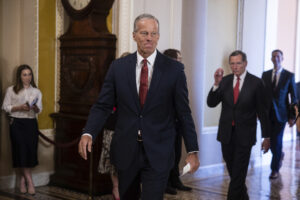Congress
Provider tax crackdown is a no-go in the House, Hawley warns
Sen. Josh Hawley is urging GOP leaders to strike Senate Finance Committee language altering a key Medicaid financing provision, warning he’s already hearing from House Republicans that it can’t clear their chamber.
“I don’t know why we would pass something that the House can’t pass and will force us into [a] conference,” the Missouri Republican said in an interview about the proposed crackdown on the state provider tax.
Hawley added that he and his fellow Senate GOP colleagues were also caught off guard by the Senate proposal — which would curtail the tax most states use to finance their Medicaid programs rather than simply freezing it, as the House did.
He summed up what he’s hearing from House Republicans: “We cannot pass this. We were not consulted.”
It’s the latest red flag for Senate Majority Leader John Thune as he tries to pass President Donald Trump’s “big, beautiful bill” next week, a necessary step if the House is going to have to advance it to the president’s desk by the GOP’s July 4 target. Thune wants the bill on the floor as soon as Wednesday.
“Unless you want to be here in August and September still doing this, I think that is a bad, bad plan,” Hawley said. “We don’t have time to reinvent the wheel.”
Hawley isn’t the only one raising concerns. House moderates are also starting to express opposition, and others within Speaker Mike Johnson’s circle described themselves to POLITICO as caught off guard.
But Hawley is offering one carrot to GOP leadership that could be critical as they try to hunt down the 50 votes they need to move forward: He said he is prepared to support the House provider tax freeze with the minor clarifications that hospital associations in 13 states, including his own, asked for last week in a letter first reported by POLITICO.
“I think that would be fine,” Hawley said, adding that rural hospitals in his state were “pretty satisfied” with the House language with some technical changes.
GOP leaders, including Senate Finance Chair Mike Crapo, have been hoping to sway Hawley and other holdouts with a proposed rural hospital fund, which they believe would offset the potential impact of the provider tax changes.
While Hawley said he was still open to including a new fund, it wouldn’t change his belief that the Senate provider tax language had to go. In addition to talking with House Republicans, Hawley said he’s delivered his message directly to Thune, who said in a brief interview Wednesday ahead of Hawley’s comments that he’s speaking to Trump on a near-daily basis and is expected to spend the weekend and into early next week negotiating with his holdouts.
“We’re talking to individual senators on an ongoing basis and hearing them out about things they want included or not included in the final draft,” Thune said.
Hawley has already spoken with Trump about the Senate language and has described the president as being “surprised” by the provider tax proposal.
Asked if he believed Trump and the White House should get involved to nudge Thune and Crapo, Hawley added that they were “stepping up their involvement.” He pointed to chief of staff Susie Wiles urging Congress to get the bill to Trump’s desk by July 4 as an example of them “trying to deliver it gently” but predicted it could become “more forceful.”
Asked about the Senate’s Medicaid language Thursday, White House spokesperson Karoline Leavitt declined to get into specifics, instead telling reporters that since “the bill hasn’t been sent to the president’s desk yet, there’s more room for change.”
Congress
Mike Johnson hails ‘progress’ toward SALT deal
The White House is close to clinching an agreement on the state and local tax deduction after a last-ditch flurry of negotiations with blue-state House GOP holdouts and Senate Republicans, according to three people granted anonymity to describe the talks.
Treasury Secretary Scott Bessent, who is brokering the politically complex deal that is key to unlocking the GOP megabill, will attend Senate Republicans lunch later today, according to a another person with direct knowledge of the matter.
Speaker Mike Johnson told reporters Friday morning that there was “a lot of progress yesterday” at an evening meeting of SALT Republicans and Treasury officials and that he expected the issue to get “resolved in a manner that everybody can live with.”
“No one will be delighted about it, but that’s kind of the way this works around here,” he said. “But the other issues [with the megabill], I think, will be resolved, hopefully today, and we can move forward.”
However, one hard-line SALT holdout, New York Rep. Nick LaLota, said: “If there was a deal, I’m not a part of it.”
Jordain Carney contributed to this report.
Congress
Capitol agenda: How Trump could get his July 4 megabill
Republicans’ “big, beautiful bill” is in tatters. President Donald Trump still wants it on his desk by July 4. Here’s everything that will have to go right to make that happen:
GOP senators and staff now believe Saturday is the earliest voting will start on the bill. Senate Majority Leader John Thune acknowledged Thursday that parliamentarian rulings forcing Republicans to rewrite key provisions of the bill are throwing his timeline into chaos.
A Saturday vote would assume no more major procedural issues, but that is not assured: Republicans could run into trouble with their use of current policy baseline, the accounting tactic they want to use to zero out the cost of tax-cut extensions. Other adverse recommendations from Parliamentarian Elizabeth MacDonough could force additional redrafts of Republicans’ tax plans.
Even if Republicans resolve every outstanding issue with the parliamentarian in the next 24 hours, Thune needs to firm up his whip count. The cap on state provider taxes remains among the thorniest issues, with senators threatening to block debate on the megabill until the Medicaid financing issue is resolved.
If the Senate does vote Saturday to proceed, expect Democrats to use the bulk of their 10 hours of debate time, while Republicans forfeit most of theirs. Then comes the main event — vote-a-rama — which would set up likely final passage for sometime Sunday.
That starts the timer for the House. GOP leaders there have pledged to give members 48 hours’ notice of a vote — and they have already advised the earliest that voting could happen is Monday evening. Republicans will have to adopt a rule before moving to debate and final passage.
But the House’s timeline depends wholly on what condition the megabill is in when it arrives from the Senate. Groups of House Republicans are already drawing red lines on matters ranging from SALT to clean-energy tax credits to public land sales. The hope is that the Senate will take care of those concerns in one final “wraparound” amendment at the end of vote-a-rama.
If they don’t, House GOP leaders are adamant that there will need to be changes — likely pushing the timeline deep into July, or perhaps beyond. For one, House Majority Leader Steve Scalise said Thursday the Senate’s slower phase-out of clean-energy tax credits “will need to be reversed,” or else.
“If there are major modifications that we cannot accept, then we would go back to the drawing board, fix some of that and send it back over,” Speaker Mike Johnson said Thursday. “So we should avoid that process, if possible.”
What else we’re watching:
— Senate war powers vote: Senators are expected to take an initial vote at 6 p.m. on Sen. Tim Kaine’s (D-Va.) resolution that would bar the president from taking further military action in Iran without congressional approval. Kaine believes Republicans will support the measure but won’t say who or how many.
— House Iran briefing: House members will receive a briefing on the Iran conflict from Defense Secretary Pete Hegseth, Secretary of State Marco Rubio, Gen. Dan Caine and CIA Director John Ratcliffe in the CVC auditorium at 9 a.m. This comes as some House lawmakers are mulling two competing war powers resolutions, which Johnson could attempt to quash in advance using a rule.
Congress
Megabill threatens to languish as challenges pile up
Republicans aren’t panicking about their fraying domestic policy bill. But they aren’t exactly sure about how it’s all going to come together, either.
Senate Republicans emerged from a closed-door lunch meeting Thursday putting on a brave face about the megabill’s progress. Yet this time last week, members were expecting revised text of the sprawling bill Monday with votes starting a couple of days later. In other words, they thought they’d be close to done by now.
Instead, Majority Leader John Thune refrained from giving his members a specific timeline during a closed-door lunch Thursday, according to three attendees granted anonymity to describe the private meeting. Senators are preparing to stay in town and vote through the weekend, but internal policy disputes and procedural roadblocks thrown up by the chamber’s parliamentarian are keeping firmer plans in flux.
A July 4 deadline being pushed by the White House hangs over Capitol Hill as the only real forcing mechanism, and some Republicans said they were glad to have it even if many others harbor doubts about whether that target can be met.
“I don’t think it gets easier to pass going longer,” said Sen. Kevin Cramer of North Dakota. “The more time we take, the more people find things they want to change.”
The latest blow for the GOP came after Senate Parliamentarian Elizabeth MacDonough warned that key Medicaid language would not comply with the strict rules that govern what can be included in a bill Republicans intend to pass along party lines using special budget rules. GOP senators expressed confidence they would be able to address MacDonough’s concerns, which some described as “technical,” and salvage the proposal.
But that, Thune acknowledged, will take time and threaten his plan of holding an initial vote Friday: “The parliamentarian’s decisions may push that back.”
Noticeably absent from the debate early Thursday was President Donald Trump, who has the bulk of his legislative agenda tied up in the bill. He returned late Wednesday from a trip to Europe and is scheduled to hold a White House event on the megabill Thursday afternoon.
His lobbying is widely seen as a necessary ingredient in getting the bill done. And for all the anxiety about the parliamentarian decisions Thursday, the more profound issue for Republicans are their internal divides about the policy provisions in the bill — particularly those dealing with Medicaid.
MacDonough’s rejection of initial language curtailing state provider taxes, which most states use to leverage federal health care dollars, emboldened the so-called “Medicaid moderates,” who believe the proposal is not ready for prime time. Nor have they been convinced by leadership’s offer of a $15 billion rural hospital fund, though negotiations are expected to force that number higher.
Sen. Josh Hawley (R-Mo.), who spoke with Trump Wednesday about the Medicaid language, said the ruling gave Republicans “a chance to get it right” and expected Trump would be more involved now that he’s “back on terra firma.”
“I think he wants this done. But he wants it done well. He doesn’t want this to be a Medicaid cut bill — he made that very clear to me,” Hawley said. “He said this is a tax cut bill, it’s not a Medicaid cut bill. I think he’s tired of hearing about all these Medicaid cuts.”
Senate Finance Chair Mike Crapo (R-Idaho) walked Republicans through MacDonough’s rulings during the closed-door lunch. Most left saying it would be relatively straightforward to tweak the proposal and keep it in the bill. Senate GOP leaders are counting on the questioned provisions to generate some $250 billion in savings to offset tax cuts and other costly items.
“I’m feeling much better after lunch,” Sen. Ron Johnson (R-Wis.) said walking out. “The parliamentarian did kind of a little bit of a hand grenade, but I’ve been encouraged by what we heard.”
The tight-lipped Crapo would not discuss details of MacDonough’s rulings Thursday. But Sen. John Hoeven of North Dakota said that, based on Crapo’s briefing, the issue had to do with a provision that would freeze provider taxes in states that have not expanded their Medicaid programs under the Affordable Care Act.
“It was a technical issue with a technical solution,” he said.
Other pitfalls remain to be seen. Republicans are still waiting for MacDonough to issue rulings on their tax plan, while other committees are waiting on final decisions on a crucial food-aid plan and other provisions they had to rework after she rejected their initial efforts.
And while senators have been focused on resolving their own disputes, they also have to be mindful of the narrowly divided House — where pockets of Republicans have continued to raise angry objections to changes their Senate counterparts have been making to the bill that passed the House last month.
No group has been more vocal than the blue-state Republicans pushing for an expansion of the state-and-local-tax deduction. They received an offer brokered by the administration Thursday that would keep the House-passed $40,000 deduction cap but lower the income threshold and change how the deduction is indexed to inflation, according to three people granted anonymity to describe the talks.
Rep. Nick LaLota (R-N.Y.) was one of several key players who poured cold water on the offer, saying that he “declined the offer to participate … in further faux-negotiations until the Senate gets real.” Sen. Markwayne Mullin (R-Okla.), a key go-between, insisted “we’re going to find a landing spot.”
For House conservatives, meanwhile, the outrage of the day was MacDonough’s new decisions axing the health care provisions — including some aimed at excluding undocumented immigrants from federal benefits. Several publicly called on senators to overrule the parliamentarian, or fire her outright — a power Thune holds.
Most Republican senators rejected that demand Thursday, warning that it would derail the reconciliation process.
“People should remember that what comes around goes around when it comes to the parliamentarian,” said Sen. Susan Collins (R-Maine), a key undecided vote. “She may rule the way you like one day, the way you don’t the next.”
Thune also rejected calls to sidestep MacDonough, though the headache could become substantially worse if Trump weighs in. So far the White House is staying out of the Senate’s procedural machinations and even Trump’s allies are signaling that he should keep quiet when it comes to MacDonough.
“I hope he doesn’t,” Cramer said.
Benjamin Guggenheim and Meredith Lee Hill contributed to this report.
-

 The Josh Fourrier Show8 months ago
The Josh Fourrier Show8 months agoDOOMSDAY: Trump won, now what?
-
Uncategorized8 months ago
Bob Good to step down as Freedom Caucus chair this week
-

 Politics8 months ago
Politics8 months agoWhat 7 political experts will be watching at Tuesday’s debate
-

 Politics8 months ago
Politics8 months agoHow Republicans could foil Harris’ Supreme Court plans if she’s elected
-
Economy8 months ago
Fed moves to protect weakening job market with bold rate cut
-
Economy8 months ago
It’s still the economy: What TV ads tell us about each campaign’s closing message
-

 Politics8 months ago
Politics8 months agoRFK Jr.’s bid to take himself off swing state ballots may scramble mail-in voting
-
Uncategorized8 months ago
Johnson plans to bring House GOP short-term spending measure to House floor Wednesday







